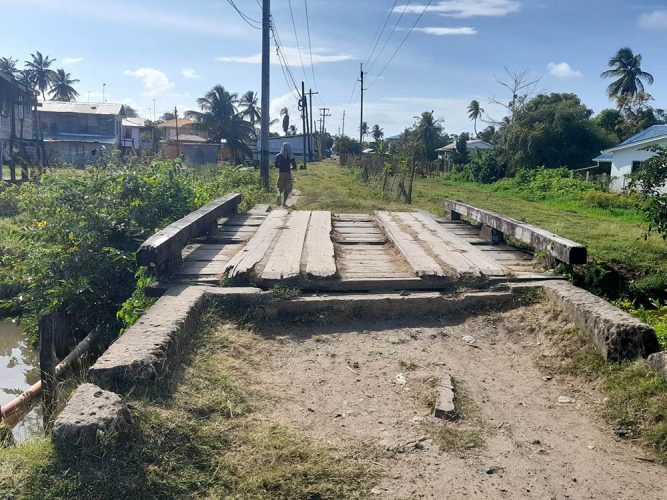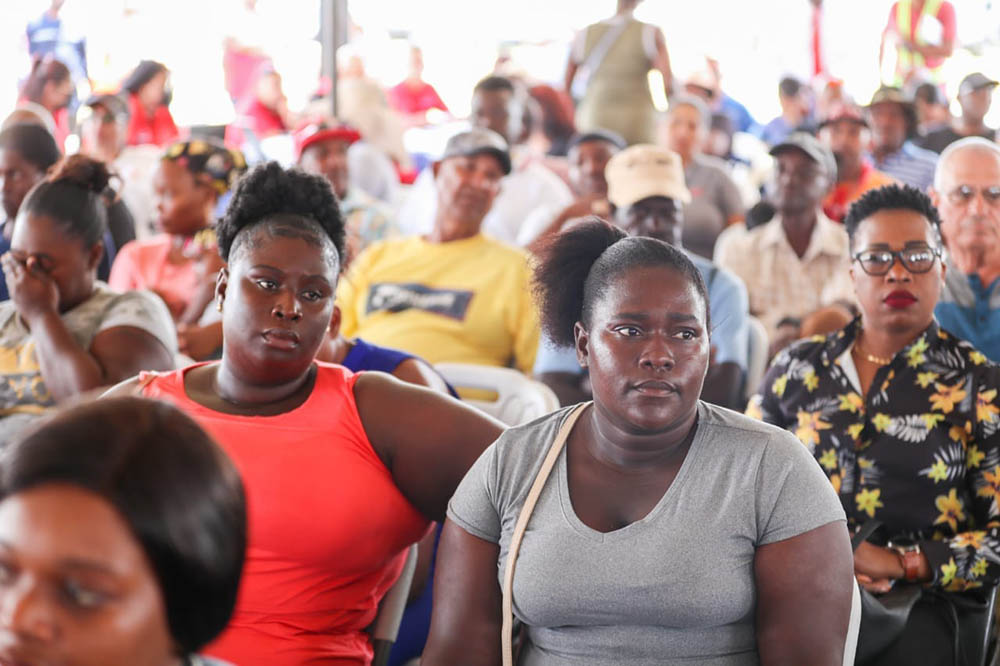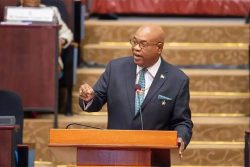The call for better infrastructure was a key issue raised in a major ministerial outreach in the historic East Coast Demerara village of Victoria yesterday.
Prime Minister Mark Phillips and 10 Ministers met villagers on the community centre ground to listen to their concerns.
Over 300 villagers were in attendance at the cordial meeting.
The meeting was chaired by Prime Minister Phillips who urged those gathered to be respectful of each other’s concerns as all remained important to the PPP/C Government.

Among the issues raised were the lack of finance to carry out projects in the community, access to jobs, tourism and education.
More importantly, the lack of work by neighbourhood authorities and the government remained a key topic during the discussion.
During the meeting, around 50 villagers spoke on various issues. They said that as descendants of the freed slaves who bought the first village, the consensus among them is that they feel a sense of neglect.
The condition of the main access road, Middle Walk; the West and East Sideline Dams; several cross streets, nearby trenches; the cemetery, the schools and health infrastructure were among the issues raised.
“Victoria has three roads, every other road is a street; the Middle Walk and the East and West Sideline. We would have loved for the Bishop (Minister of Public Works, Juan Edghill) to be here because obviously we have been seeing what has been happening in other places. It is not to say that this Government has not done anything in Victoria that is not what we are saying. Our priority if there is one thing that can be delivered in this village, ducklings are important, and streets are important…..those three roads that we have the Middle Walk and the East and West Sideline to be accessible to the villages, that would be doing something for this village”, Member of the Village Group, Victoria Indaba, Abraham Poole said.
Poole further explained that for too long, that is for over a decade, the villagers have been approaching the Government and from time to time it is felt as though their cries have been not heard.
Poole lamented that while they call for more to be done to the infrastructure of the village he believes the call is not ingenious but remains one which the Government could fulfil, especially with the resources at hand.
“As citizens we have a right to development, we have a right to the resources, I don’t care who you support. That is not the issue. That is not our gossip. What we care about is that we have our part. We are not ingenious of what we are saying because we know they have other communities, we are not the only community. We can’t just go to Enmore and say all the roads in Enmore are done, so all in Victoria should be done. That’s not understanding development but here now that we have the proceeds of oil, and you are in a better position than any other previous government in our history”, he said.
Poole said the work on the roads will not only boost access but also lift several other sectors.
Tourism
On the issue of tourism, it was noted by the villagers that there is a need for the history of the village to be showcased.
“We have the skill, we have the methodology, what we don’t have are the resources. We are clear in our vision as to what we want and what our village should be”, Poole maintained
Minister of Tourism, Industry and Commerce, Oneidge Walrond, who was present at the head table promised that Victoria will be better integrated into the tourism product and through the development of its business, the villagers can also earn from that development.
Education
Villagers called for schools to be rehabilitated and built to accommodate the growing skills needed for the workforce.
Pointing towards the issues of higher education, one villager expressed the idea of having an industrial school built in the village to accommodate the growing number of skills needed.
“We have been in need of a modern primary school in this village for over 15 years. The current primary school has no playground. The kids play at the school or the burial ground. We have identified where we would like the primary school to be built and we have alternatives that we are willing to discuss. That’s one thing that we need here; a modern 21st century primary school. I would like also to have a lot of the training programmes that are being talked about to be implemented here in a school that we have built, where we have the facility for training welders, we have the facilities to train electrical instructors, we have the facilities to train motor mechanics and others”, villager, Desmond Saul said.
Land
While Victoria remain the village in which the first freed African slaves lived, land remains an issue also as swathes aren’t regularized.
This issue has led to persons even venturing into the courts for remedies on various matters.
As such, according to the Attorney General and Minister of Legal Affairs, Anil Nandlall those matters will be ratified through various investigations into the lands in the area. The investigation according to him will see a complete resolution to the problem.
“We have to regularize your occupation and that is why you see people from lands and survey are here, that is the part of the equation I would like to focus on to put you back on the land to make you productive, so you could contribute to the economic drive taking place and you can contribute to making Guyana the breadbasket of the Caribbean our long-held aspiration and we intend to pursue that”, he said.
After the four-hour engagement, the Prime Minister said that all the concerns will be addressed soon.
Other ministers in attendance were Minister of Health, Dr Frank Anthony; Minister of Local Government, Nigel Dharamlall; Minister of Human Services, Vindhya Persaud; Minister of Culture, Youth and Sport, Charles Ramson; Minister in the Ministry of Housing, Susan Rodrigues, Minister of Agriculture, Zulfikar Mustapha, Minister of Labour Joseph Hamilton and Minister in the Prime Minister’s Office, Kwame McCoy.
A bridge in Victoria









